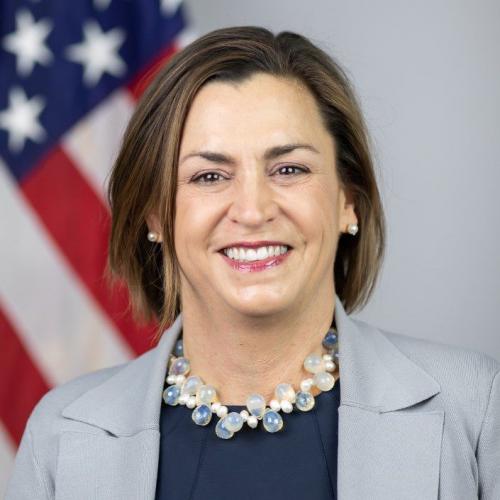
Part of what has made me successful in government is the range of my experience, my ability to bring the right people to the table and critical thinking skills. There are a number of hard policy issues I am working on – from a secure clean energy transition, to GPS resilience to supply chain security– that benefit from my understanding of technology, cybersecurity, infrastructure, and regulatory policy. These are things I learned about because of my willingness to take jobs that were out of my comfort zone. I’ve found that you can learn almost anything when you put your mind to it; you just have to get over the fear of not knowing what you don’t know. That is the advice I would offer to every Sanford student and it has served me well.
Caitlin Durkovich PPS ’94
Caitlin Durkovich serves as Special Assistant to President Biden and Senior Director for Resilience and Response for the National Security Council. She previously served under the Obama-Biden administration as Chief of Staff for the National Protections and Programs Directorate, which preceded the Cybersecurity and Infrastructure Security Agency at the Department of Homeland Security.
Q&A with Caitlin Durkovich
What is the most interesting work or highlight so far in your career?

The most interesting work so far in my career has been my short time at the National Security Council. I manage policy, which is very different from managing people. The issues I work on range widely – from cyber security and the security of the nation’s Capitol, to hurricanes and wildland fires, to more technical issues like electric grid and GPS resilience.
What are you most proud of in your career to date?
The ability to get things done in the bureaucracy as well as the relationships I have built along the way. It’s hard to get much done if people don’t respect you and want to work with you.
What is a story/example you tell others about the importance of the work you do?
This year is the one of the worst wildland fires seasons in our nation’s history. It is a result of climate change and a chronic underinvestment in forest management and a federal woodland workforce. We’ve managed to temporarily increase federal firefighter pay, address firehouse supply issues through use of the Defense Production Act, address localized shortages of jet fuel, and make a significant down payment of long term forest/fuel management in the FY22 budget and the Bipartisan Infrastructure Deal. Hard problems require multiple solutions and it is amazing to see what happens when the interagency policy process, which we lead at the NSC, works.
Why does public policy matter in 2021 and beyond? How has it evolved (if you think it has)?
Public policy matters in 2021 because of the complexity of the issues we are dealing with and the various political factions and interest groups that are part of the process. Public policy is about making sure that everyone sees something in the policy for them, and it’s hard to do that when you have to appease so many entities. If you’re good at public policy, negotiation gets everyone a win and acceptance that, while they may not have gotten everything they wanted, the end result is really benefiting the public good.
How would you describe Sanford’s contribution to public policy over the past 50 years?
Sanford’s contribution is professionalizing the field of public policy and educating and inspiring multiple generations of Blue Devils to change the world.
What is the most important skill that policy students should learn?
To write well and write quickly. That means articulating your argument and recommendations in two pages or less, and without jargon.
Advice to current students?
Work hard, always accept opportunities to roll up your sleeves and do the dirty, hard work, and don’t take no for an answer.
